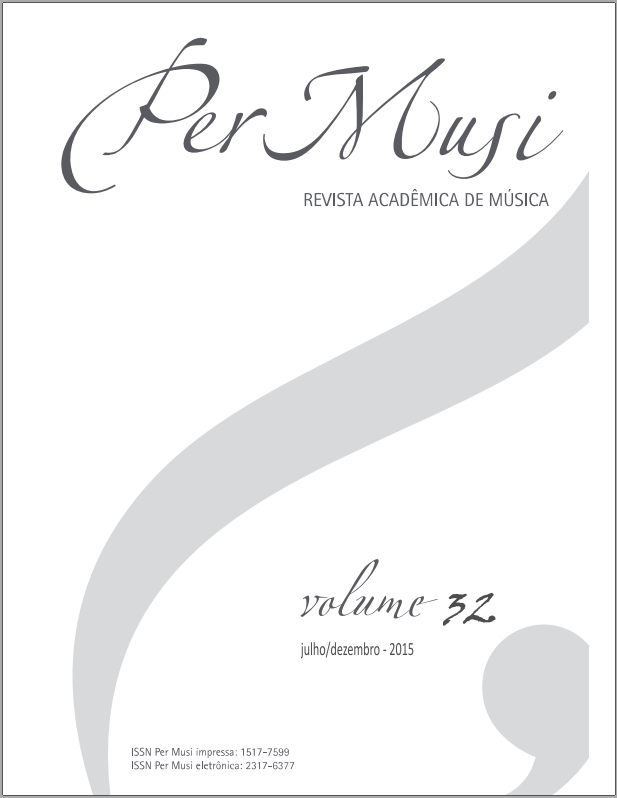Initial practice and performance of Haydn´s Minuets by pianists
the effects of the deprivation of stimulus in sensorial feedback in different conditions of study.
Keywords:
Sensorial feedback, Instrumental practice, Academic levels, Deprivation of sensorial stimulusAbstract
The present study aimed at investigating the effect of stimulus deprivation (aural, visual and kinesthetic) in the sensorial feedback during the initial approach to piano pieces by students belonging to different academic levels. The results revealed the potential effect of the academic level on the time spent in practice for conditions A, C and D, as well as in the musical understanding and in the quality of attained performance takes (products), for conditions A and B. In terms of strategies and performances, data from conditions C and D suggested the performance under such conditions seem to depend on the cumulative competences of the student rather on the academic level.
References
AIELLO, R.; WILLIAMON, A. (2002). “Memory”. In: PARNCUTT, R.; Mc PHERSON, G., (Org). The science & psychology of music performance. New York: Oxford University Press, p.167-181.
ALTENMÜLLER, E.; SCHNEIDER, S. (2009). “Planning and performance”. In: HALLAM, S.; CROSS, I.; THAUT, M. (Eds.). The Oxford handbook of Music Psychology. New York: Oxford University Press, p.332-343.
BANTON, L. (1995). “The role of visual and auditory feedback during the sight- reading of music”. Psychology of Music, n.23, p. 3-16.
CHAFFIN, R.: LOGAN, T.; BEGOSH, K. (2009). “Performing from memory”. In: HALLAM, S.; CROSS, I.; THAUT, M. (Eds.), The Oxford Handbook of Music Psychology, New York: Oxford University Press, p.352-363.
FINNEY, S. (1997). “Auditory feedback and musical keyboard performance”. Music Perception, n.15, p.153-174.
FINNEY, S.; PALMER, C. (2003). “Auditory feedback and memory for music performance: Sound evidence for an encoding effect”. Memory & Cognition, n.31, p.51-64.
GINSBORG, J. (2005). “Strategies for memorizing music”. In: WILLIAMON, A. Musical excellence: strategies and techniques to enhance performance. Great Britain: Oxford University Press, p.123-141.
GRUHN, W. (2005) “Understanding musical understanding”. In: ELLIOTT, D. (Ed.), Praxial music education. New York: University Press, p 98-111.
HAIR, J.; BLACK, W.; BABIN, B.; ANDERSON, E.; TATHAM, R. (2009) Análise multivariada de dados, 6ed. Porto Alegre: Bookman, p.482-535.
HIGHBEN, Z.; PALMER, C. (2004). “Effects of auditory and motor mental practice in memorized piano performance”. Bulletin of the Council for Research in Music Education. Illinois, n.159, p.1-8.
REPP, B. (1999). “Effects of auditory feedback deprivation on expressive piano performance”. Music Perception, n.16, p.409-438.
WÖLLNER, C.; WILLIAMON, A. (2007). “An exploratory study of the role of performance feedback and musical imagery in piano playing”. Research Studies in Music Education, n. 29, p.39-54.
Downloads
Published
Issue
Section
License
Copyright (c) 2015 Per Musi

This work is licensed under a Creative Commons Attribution 4.0 International License.

Except where otherwise noted, contents on this site are licensed under a Creative Commons - Atribuição 4.0 Internacional.


